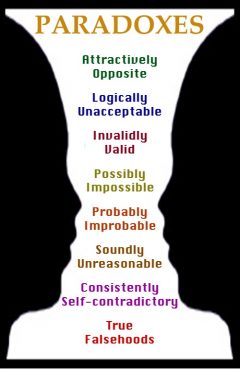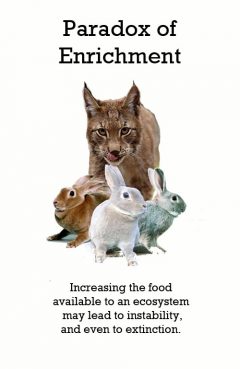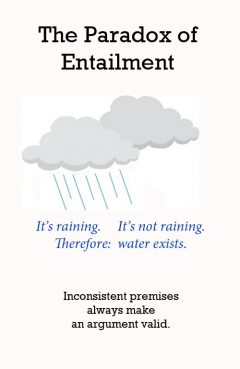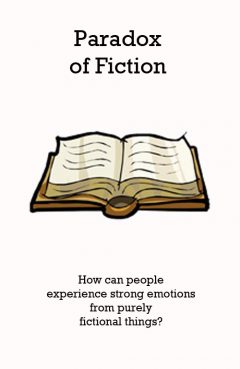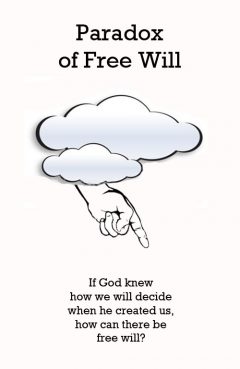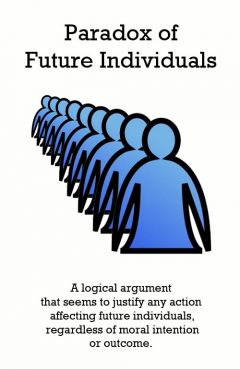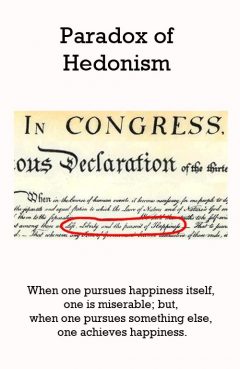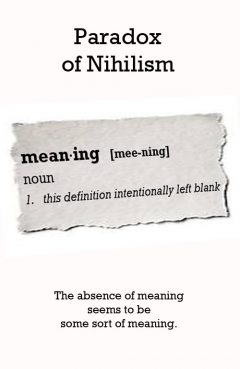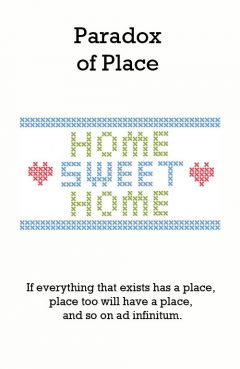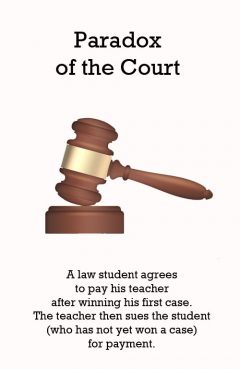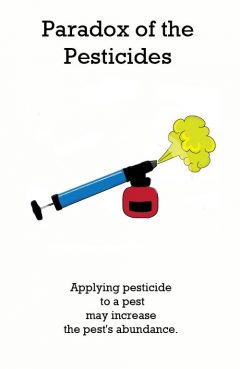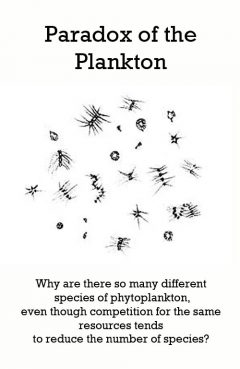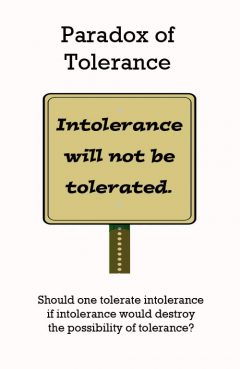Paradox of Analysis
Release Date: //
Country of Release:
Length:
MPAA:
Medium: Paradox
Genre:
Release Message: It seems that no conceptual analysis can both meet the requirement of correctness and of informativeness.
Description: It seems that no conceptual analysis can both meet the requirement of correctness and of informativeness.
Paradox of Anti-Semitism
Release Date: //
Country of Release:
Length:
MPAA:
Medium: Paradox
Genre:
Release Message: A book arguing that the lack of external persecutions and antagonisms results in the dissolution of Jewish identity, a theory that resonates in works of Dershowitz and Sartre.
Description: A book arguing that the lack of external persecutions and antagonisms results in the dissolution of Jewish identity, a theory that resonates in works of Dershowitz and Sartre.
Paradox of Enrichment
Release Date: //
Country of Release:
Length:
MPAA:
Medium: Paradox
Genre:
Release Message: Increasing the food available to an ecosystem may lead to instability, and even to extinction. Authored by Michael L. Rosenzweig.
Description: Increasing the food available to an ecosystem may lead to instability, and even to extinction.
The Paradox of Entailment
Release Date: //
Country of Release:
Length:
MPAA:
Medium: Paradox
Genre:
Release Message: Inconsistent premises always make an argument valid.
Description: The paradoxes of material implication are a group of formulae which are truths of classical logic, but which are intuitively problematic. One of these paradoxes is the paradox of entailment. The root of the paradoxes lies in a mismatch between the interpretation of the validity of logical implication in natural language, and its formal interpretation in classical logic, dating back to George Boole's algebraic logic. In classical logic, implication describes conditional if-then statements using a truth-functional interpretation, i.e. "p implies q" is defined to be "it is not the case that p is true and q false". Also, "p implies q" is equivalent to "p is false or q is true". For example, "if it is raining, then I will bring an umbrella", is equivalent to "it is not raining, or I will bring an umbrella, or both". This truth-functional interpretation of implication is called material implication or material conditional.
Paradox of Excellence
Paradox of Fiction
Release Date: //
Country of Release:
Length:
MPAA:
Medium: Paradox
Genre:
Release Message: How can people experience strong emotions from purely fictional things? Authored by Colin Radford and Michael Weston.
Description: A philosophical problem about how people can experience strong emotions from purely fictional things, such as art, literature, and imagination. The paradox draws attention to an everyday issue of how people are moved by things which, in many ways, do not really exist
Paradox of Free Will
Release Date: //
Country of Release:
Length:
MPAA:
Medium: Paradox
Genre:
Release Message: If God knew how we will decide when he created us, how can there be free will?
Description: The argument from free will, also called the paradox of free will or theological fatalism, contends that omniscience and free will are incompatible and that any conception of God that incorporates both properties is therefore inherently contradictory. If God knew how we will decide when he created us, how can there be free will?
Paradox of Future Individuals
Release Date: //1982
Country of Release:
Length:
MPAA:
Medium: Paradox
Genre:
Release Message: A logical argument that seems to justify any action affecting future individuals, regardless of moral intention or outcome.
Description: Also known as the non-identity problem, and offers a logical argument that seems to justify any action affecting future individuals, regardless of moral intention or outcome. Any large-scale change in human behavior will literally change the human race. Addresses our moral obligation to future persons to plan for the future now. In The Paradox of Future Individuals, Kavka presents the example of the slave child. A couple, who has decided not to have any children of their own, are offered $50,000 to create a child for someone else. This child will then be used as a slave. The couple is aware of the state of living that their future child will be put into. If they make this agreement they will use their earnings to buy a yacht. Because they have decided at the moment to not have any children of their own, this child would not exist unless he or she was created to be sold as a slave. æAccording to the extended obligation principle ñOne can have an obligation to choose act or policy A rather than alternative B if and only if (i) if one chose B, some particular person would exist and be worse off than if one had chosen A or (ii) if one chose A, some particular person would exist and be better off than if one had chosen B.î ææAccording to part two of this principle, the decision to create this child to be sold into slavery is moral because a child is given existence who would never have had an existence. When looking at this principle we must consider if mere existence is what should decide a person's fate. If we allowed people to use the principle that mere existence is what matters when bringing future people into the world, what motivation do parents have to protect their future children from any kind of harm? According to this principle, children who are abused and neglected are better off soley because they exist. This error in the extended obligation principle is what brings Kavka to the idea of a restricted life principle.
Paradox of Hedonism
Release Date: //
Country of Release:
Length:
MPAA:
Medium: Paradox
Genre:
Release Message: In seeking happiness, one does not find happiness.
Description: When one pursues happiness itself, one is miserable; but, when one pursues something else, one achieves happiness. In seeking happiness, one does not find happiness.
Paradox of Nihilism
Paradox of Place
Release Date: //
Country of Release:
Length:
MPAA:
Medium: Paradox
Genre:
Release Message: If everything that exists has a place, place too will have a place, and so on ad infinitum. Authored by Zeno.
Description: Given an object, we may assume that there is a single, correct answer to the question, ñWhat is its place?î Because everything that exists has a place, and because place itself exists, so it also must have a place, and so on forever. That's too many places, so there is a contradiction. The original source is Aristotle'sæPhysics (209a23-25 and 210b22-24).
Paradox of Plenty (The Resource Curse)
Release Date: //
Country of Release:
Length:
MPAA:
Medium: Paradox
Genre:
Release Message: Countries and regions with an abundance of natural resources tend to have less economic growth and worse development outcomes than countries with fewer natural resources.
Description: Countries and regions with an abundance of natural resources, specifically point-source non-renewable resources like minerals and fuels, tend to have less economic growth and worse development outcomes than countries with fewer natural resources.
Paradox of Poetry
The Paradox Of The Court
Release Date: //
Country of Release:
Length:
MPAA:
Medium: Paradox
Genre:
Release Message: A law student agrees to pay his teacher after winning his first case. The teacher then sues the student (who has not yet won a case) for payment.
Description: Protagoras argued that if he won the case he would be paid his money. If Euathlus won the case, Protagoras would still be paid according to the original contract, because Euathlus would have won his first case. Euathlus, however, claimed that if he won, then by the court's decision he would not have to pay Protagoras. If, on the other hand, Protagoras won, then Euathlus would still not have won a case and would therefore not be obliged to pay. The question is: which of the two men is in the right? The story is related by the Latin author Aulus Gellius in Attic Nights.[1]
Paradox of the Infinite
Paradox of the Pesticides
Paradox of the Plankton
Release Date: //
Country of Release:
Length:
MPAA:
Medium: Paradox
Genre:
Release Message: Why are there so many different species of phytoplankton, even though competition for the same resources tends to reduce the number of species?
Description: Why are there so many different species of phytoplankton, even though competition for the same resources tends to reduce the number of species?
Paradox of Thrift
Release Date: //
Country of Release:
Length:
MPAA:
Medium: Paradox
Genre:
Release Message: If everyone saves more money during times of recession, then aggregate demand will fall and will in turn lower total savings in the population. Conceived by John Maynard Keynes.
Description: If everyone saves more money during times of recession, then aggregate demand will fall and will in turn lower total savings in the population.
Paradox of Toil
Release Date: //
Country of Release:
Length:
MPAA:
Medium: Paradox
Genre:
Release Message: If everyone tries to work during times of recession, lower wages will reduce prices, leading to more deflationary expectations, leading to further thrift, reducing demand and thereby reducing employment.
Description: If everyone tries to work during times of recession, lower wages will reduce prices, leading to more deflationary expectations, leading to further thrift, reducing demand and thereby reducing employment.
Paradox of Tolerance
Release Date: //
Country of Release:
Length:
MPAA:
Medium: Paradox
Genre:
Release Message: Should one tolerate intolerance if intolerance would destroy the possibility of tolerance? Authored by Karl Popper.
Description: Should one tolerate intolerance if intolerance would destroy the possibility of tolerance?
